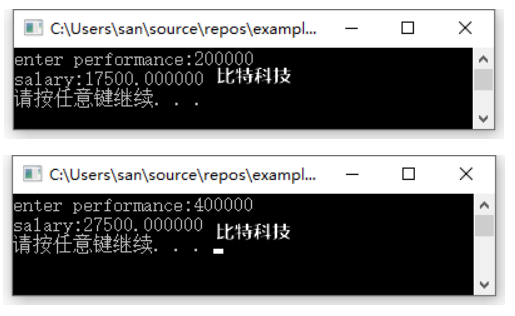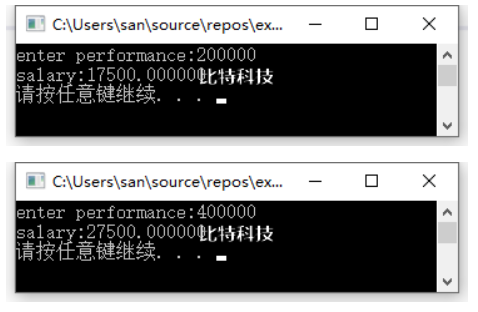企业发放的奖金根据利润提成。利润I低于或等于100000元的,奖金可提成10%;利润高于100000元,低于200000元(100000<I≤200000)时,低于100000元的部分按10%提成,高于100000元的部分,可提成7. 5%;200000<I≤400000时,低于200000元的部分仍按上述办法提成(下同)。高于200000元的部分按5%提成;400000<<I≤600000元时,高于400000元的部分按3%提成;600000<1≤1000000时,高于600000元的部分按1.5%提成;I>1000000时,超过1000000元的部分按1%提成。从键盘输入当月利润I,求应发奖金总数。要求:(1) 使用if语句编写程序。(2) 使用switch语句编写程序。
(1) 使用if语句编写程序。
解题思路: 先将每一档的最大奖金算出来,在某一个区间时,则那小于这一档的奖金加上多出部分的奖金即可,例如:
先列出100000档的奖金是10000,则180000就是10000 + (180000-100000) * 0.075;
列出200000档的奖金是第一档加上多出100000部分的7.5%得到17500,则300000就是17500 + (300000-200000)*0.05;
答案:
#include <stdio.h>
int main()
{
double I, salary = 0;
printf("enter performance:");
scanf_s("%lf", &I);
if (I < 0) {
printf("请输入一个正数
");
system("pause");
return -1;
}
double salary1 = 100000 * 0.1;//10万的奖金
double salary2 = (200000 - 100000) * 0.075 + salary1;//20万的奖金
double salary3 = (400000 - 200000) * 0.05 + salary2;//40万的奖金
double salary4 = (600000 - 400000) * 0.03 + salary3;//60万的奖金
double salary5 = (1000000 - 600000) * 0.015 + salary4;//100万的奖金
if (I <= 100000) {
salary = I * 0.1;//小于100000按10%提成
}else if (I > 100000 && I <= 200000) {
salary = salary1 + (I - 100000) * 0.075;//多出10万的按比例计算,加上10w的奖金
}else if (I > 200000 && I <= 400000) {
salary = salary2 + (I - 200000) * 0.05;//多出20万的按比例计算,加上20w的奖金
}else if (I > 400000 && I <= 600000) {
salary = salary3 + (I - 400000) * 0.03;//多出40万的按比例计算,加上40w的奖金
}else if (I > 600000 && I <= 1000000) {
salary = salary4 + (I - 600000) * 0.015;//多出60万的按比例计算,加上60w的奖金
}else if (I > 1000000){
salary = salary5 + (I - 1000000) * 0.01;//多出100万的按比例计算,加上100w的奖金
}
printf("salary:%f
", salary);
system("pause");
return 0;
}

(2) 使用switch语句编写程序。
解题思路: 与第一题思路没有太大差别,区别在于switch语句的case子句中需要是一个常量整数,并且switch中若子句中没有break将循序向下执行,直到遇到break才会跳出switch语句,如果这时候将利润除以10w,则得到0~9的数字,其中0表示小于10w,1表示介于10~20w,2、3表示介于20~40w,4、5表示介于40~60w,6、7、8、9表示介于60~100w,否则就是大于100w
答案:
#include <stdio.h>
int main()
{
double I, salary = 0;
printf("enter performance:");
scanf_s("%lf", &I);
if (I < 0) {
printf("请输入一个正数
");
system("pause");
return -1;
}
double salary1 = 100000 * 0.1;//大于100000时0~100000的奖金
double salary2 = (200000 - 100000) * 0.075 + salary1;//大于200000时0~20万的奖金
double salary3 = (400000 - 200000) * 0.05 + salary2;//大于400000时0~40万的奖金
double salary4 = (600000 - 400000) * 0.03 + salary3;//大于600000时0~60万的奖金
double salary5 = (1000000 - 600000) * 0.015 + salary4;//大于1000000时0~100万的奖金
int grade = I / 100000;
switch(grade) {
case 0:
salary = I * 0.1; break;
case 1:
salary = salary1 + (I - 100000) * 0.075; break;
case 2://会顺序执行到下一个break处
case 3:
salary = salary2 + (I - 200000) * 0.05; break;
case 4:
case 5:
salary = salary3 + (I - 400000) * 0.03; break;
case 6:
case 7:
case 8:
case 9:
salary = salary4 + (I - 600000) * 0.015; break;
default:
salary = salary5 + (I - 1000000) * 0.01; break;
}
printf("salary:%f
", salary);
system("pause");
return 0;
}
